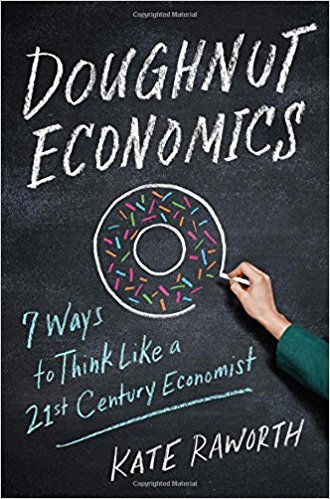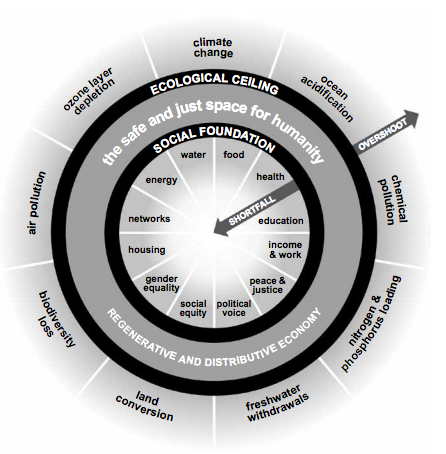You have /5 articles left.
Sign up for a free account or log in.
 Doughnut Economics: Seven Ways to Think Like a 21st-Century Economist by Kate Raworth
Doughnut Economics: Seven Ways to Think Like a 21st-Century Economist by Kate Raworth
Published in November of 2017.
There is very little in Kate Raworth’s carefully reasoned and passionately argued Doughnut Economics that which I agree.
I disagree with the book's characterization of how economists think, how the economics is practiced, and what the goals of economics should be.
Doughnut Economics is the last book that I finished in 2017. For 2018, I’d like to read more books that challenge my thinking. Books that run counter to my moderate tendencies.
Doughnut Economics is a call for a progressive economics. For a science based on the equitable distribution of societal resources, rather than the maximization of individual utility.
I’ve copied the doughnut image below that Raworth uses as a visual representation of the progressive economics in which she calls for:

Doughnut Economics drove me crazy from the left. I found Raworth’s insistence that economic growth is in opposition to human improvement to be naive.
Absent from the book is any balanced accounting of the potential unintended consequences of protectionist policies or economic redistribution efforts.
One need not have a theological devotion to market forces to be aware of the dangers of a planned economy. Those who believe in the benefits of free trade and limited government involvement in the economy can also be concerned about persistent poverty and rising inequality.
While Doughnut Economics left me unconvinced of the merits of its arguments, the book did leave me wondering about the reasons behind this reaction. Does my take on the book - one which is not all that positive - have to do more with the quality of its arguments or with my own beliefs and biases?
My sense is that my progressive colleagues will think that Doughnut Economics is great. Perhaps they know something that I don’t.
Can you suggest some books on economics that (like Doughnut Economics) that are well-argued and robustly supported with both data and historical analysis - and that differs strongly from moderate thinking?
In 2018 I’d like to have my mind changed from both the left and the right.
Can you name the best defense of neoliberal economics that you have come across? Something to balance out Doughnut Economics.
When was the last time that you read a book that actually changed your thinking?
Can we agree that in 2018 that we will read books that we disagree with?








